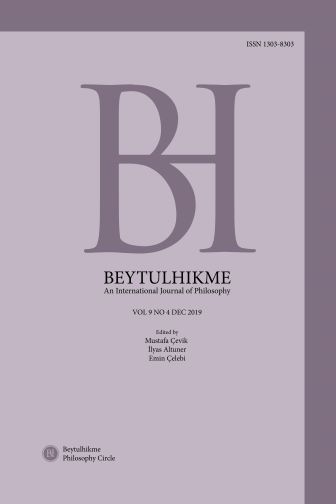Wittgenstein Felsefesindeki Değişime Dair Bir Tahlil: Anlık Bir Devrim mi Yoksa Diyalektik Bir Sonuç mu?
Author :
Abstract
Ludwig Wittgenstein’ın esas itibariyle birbirine karşıt olan erken ve geç dönem felsefesi arasındaki fikri değişimi konu edinen bu çalışmada bu değişimin makul bir açıklamasını ortaya koymak amaçlanmaktadır. Hâkim literatürde bu değişimin çeşitli anlık ilham ve aydınlanmalar sonucu gerçekleştiği kanaati mevcuttur. Fakat bizim bu çalışmada ifade etmeye çalışacağımız husus, bu değişimin anlık bir devrimden ziyade diyalektik bir sürecin sonucu olduğudur. Bu bağlamda, Wittgenstein’ın genellikle göz ardı edilen “geçiş dönemi” düşüncelerini ele alarak Wittgenstein’ın erken dönem felsefesi ile geç dönem felsefesi arasındaki fikri değişimin hangi saiklerden hareketle gerçekleştiğini, Tractatus Logico-Philosophicus’taki kuramın kendi çatısı altında ortaya çıkan problemli durumları ele alarak anlatmayı hedefliyoruz. Bu bağlamda, Pierro Sraffa ve Frank. P. Ramsey tarafından Wittgenstein’a sunulan eleştirel katkıları ve Tractatus Logico-Philosophicus’taki kuramdan uzaklaşmasına yol açan renk önermelerine ilişkin problemli durumu tartışmayı düşünüyoruz. Böylelikle Wittgenstein felsefesinde yaşanan değişimin anlık bir fikir değiştirme değil; karşıt fikirlerin çarpışarak ilerlemesi anlamında diyalektik bir sürecin sonucu olduğunu ifade etmeye çalışmaktayız.
Keywords
Abstract
In this study, we aim to offer a plausible explanation of the intellectual transition between the early and later periods Ludwig Wittgenstein. In the secondary literature, this shift is generally and commonly taken as a philosophical metamorphosis that took place as a result of many momentary inspirations or conversions. But in this paper, our main argument is that this shift is a result of a dialectical process, not a momentary metamorphosis. In this context, by focusing on Wittgenstein’s transition-period thoughts which are commonly ignored, we aim to discuss the reasons why the philosophical shift between his early and later thoughts took place by delving into the theoretical problems in Tractatus Logico-Philosophicus. And to achieve this aim, we will focus on the critical influence of Pierro Sraffa and Prank P. Ramsey on Wittgenstein, and we will also examine the problems of color propositions that led him to abandon his thoughts in Tractatus Logico-Philosophicus. We conclude that the shift in Wittgenstein’s philosophy was not a momentary metamorphosis; but a result of a dialectical process, which we interpret as progress of contrary thoughts confronting each other.
Keywords
- Engelmann, M. L. (2013). Wittgenstein’s Philosophical Development: Phenomenology, Grammar, Method and Anthropological View. Basingstoke: Palgrave Macmillan.
- Fann, K. T. (1971). Wittgenstein’s Conception of Philosophy. California: University of California Press.
- Glock, H.-J. (2005). Ramsey and Wittgenstein: Mutual Influences. F. P. Ramsey: Critical Reassessments. (Ed. M. Frapoli). London: Continuum Publishing, 4170.
- Hacker, P. M. (1986). Insight and Illusion: Themes in The Philosophy of Wittgenstein. New York: Oxford University Press.
- Hartnack, J. (2006). Wittgenstein and Modern Philosophy. (Trabns. M. Kranston). London: Methuen & Co.
- Hintikka, J. (2015). Wittgenstein Üzerine. (Çev. F. Osman). İstanbul: Sentez Yayınları.
- Hume, D. (1999). An Enquiry Concerning Human Understanding. (Ed. T. L. Beauchamp). Oxford: Oxford University Press.
- Jacquette, D. (1998). Wittgenstein’s Thought in Transition. West Lafayette: Purdue University Press.
- Malcolm, N. (2001). Ludwig Wittgenstein: A Memoir. New York: Oxford University Press.
- McGuinnes, B. (2008). Wittgenstein in Cambridge Letters and Documents 1911-1951. Oxford: Blackwell Publishing.
- Monk, R. (2005). Wittgenstein: Dahinin Görevi. (Çev. B. Kılınçer, & T. Er). İstanbul: Kabalcı Yayınevi.
- Moore, G. E. (1955). Wittgenstein’s Lectures in 1930-1933. Mind, 253, 1-27.
- Pears, D. (1988). The False Prison: A Study of the Development of Wittgenstein’s Philosophy, vol. 2. New York: Oxford University Press.
- Ramsey, F. P. (1950). The Foundations of Mathematics and Other Logical Essays. Ed. (R. B. Braithwaite). London: Routledge & Kegan Paul.
- Sayan, E. (2013). Renklerin Uzlaşmazlığı. Tutarsızlığın İz Sürücüsü: Dilde/Düşüncede Teo Grünberg'e Armağan. (Ed. Z. Kutlusoy). Ankara: İmge Kitabevi, 215-225.
- Sen, A. (2003). Sraffa, Wittgenstein, and Gramsci. The Journal of Economic Literature, XLI, 1240-1255.
- Sluga, H. (1996). Wittgenstein: Life and Work An Introduction. D. G. Hans Sluga içinde, The Cambridge Companion to Wittgenstein. (Ed. H. Slugas). Cambridge: Cambridge University Press, 1-33.
- Soykan, Ö. N. (2006). Felsefe ve Dil: Wittgenstein Üstüne Bir Araştırma. İstanbul: MVT Yayıncılık.
- Sraffa, P. (1960). Production of Commodities by Means of Commodities: Prelude to a Critic of Economic Theory. London: Cambridge University Press.
- Waismann, F. (2003). Ludwig Wittgenstein and the Vienna Circle: Conversations Recorded by Friedrich Waismann. (Trans. J. Schulte, & B. McGuinnes). London: Basil Blackwell Publishing.
- Wittgenstein, L. (1974b). Philosophical Grammar. (Trans. A. Kenny). Oxford: Basil Blackwell Publishing.
- Wittgenstein, L. (1974a). Tractatus Logico Philosophicus. (Trans. D. F. Pears). London: Kegan Paul.
- Wittgenstein, L. (2007). Remarks on Colour. (Trans. L. L. McAlister). California: University of California Press.
- Wittgenstein, L. (2009). Philosophical Investigations. (Trans. G. E. M. Anscombe & P. M. Hacker, & J. Schulte). London: Blackwell Publishing.
- Wittgenstein, L. (2011). Mavi Kitap-Kahverengi Kitap. (Çev. D. Şahiner). İstanbul: Türkiye İş Bankası Kültür Yayınları. Öz: Ludwig Wittgenstein’ın esas itibariyle birbirine karşıt olan erken ve geç dönem felsefesi arasındaki fikri değişimi konu edinen bu çalışmada bu değişimin makul bir açıklamasını ortaya koymak amaçlanmaktadır. Hâkim literatürde bu değişimin çeşitli anlık ilham ve aydınlanmalar sonucu gerçekleştiği kanaati mevcuttur. Fakat bizim bu çalışmada ifade etmeye çalışacağımız husus, bu değişimin anlık bir devrimden ziyade diyalektik bir sürecin sonucu olduğudur. Bu bağlamda, Wittgenstein’ın genellikle göz ardı edilen “geçiş dönemi” düşüncelerini ele alarak Wittgenstein’ın erken dönem felsefesi ile geç dönem felsefesi arasındaki fikri değişimin hangi saiklerden hareketle gerçekleştiğini, Tractatus Logico-Philosophicus’taki kuramın kendi çatısı altında ortaya çıkan problemli durumları ele alarak anlatmayı hedefliyoruz. Bu bağlamda, Pierro Sraffa ve Frank. P. Ramsey tarafından Wittgenstein’a sunulan eleştirel katkıları ve Tractatus Logico-Philosophicus’taki kuramdan uzaklaşmasına yol açan renk önermelerine ilişkin problemli durumu tartışmayı düşünüyoruz. Böylelikle Wittgenstein felsefesinde yaşanan değişimin anlık bir fikir değiştirme değil; karşıt fikirlerin çarpışarak ilerlemesi anlamında diyalektik bir sürecin sonucu olduğunu ifade etmeye çalışmaktayız. Anahtar Kelimeler: Anlamın resim kuramı, renk önermelerinin bağdaşmazlığı, eleştirel katkılar, geçiş dönemi.





